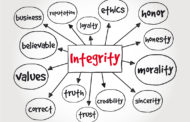By Michael Stern
Regardless of your political orientation, it is likely that you’ve been having thoughts about how terrible it would be if “the other guy” wins. With everything going on in the world right now, it seems reasonable to feel anxious, overwhelmed, or exhausted. That makes it the perfect opportunity to practice positive thinking by focusing on and celebrating the good things in life.

Positive Outlook and Emotional Intelligence
As a trained emotional intelligence coach, I understand positive outlook to be the ability to see the positive in people, situations, and events. It means being persistent in pursuing goals despite setbacks and obstacles. (1)
Research shows that a positive outlook tends to lead to positive emotions (2). Also, people who frequently experience and express positive emotions are more resilient, resourceful, socially connected, and more likely to function at optimal levels. (3)
Positive Thinking is not Magical Thinking
It’s important to remember that ‘positive thinking’ will not solve all our problems, and research shows it can actually create more problems, for example:
- Fighting to suppress or control your thoughts and feelings may amplify their intensity.
- Delusional positive thinking about outcomes can unintentionally make us feel as if we have already accomplished something we have yet to accomplish, causing us to be complacent.
- Un-tempered optimism can lead us to persist in situations that are actually dangerous, while ‘realistic pessimism’ may be more realistic and safer.
We need to be careful not to confuse ‘positive thinking’ with delusional thinking – thinking that ‘everything is going to be okay’ without any effort or discernment on our part. Instead, we can commit to showing up to participate fully in our lives, learning from our experiences, and finding ways to improve a situation. And rather than striving for unconditional optimism in all circumstances, we can cultivate a generally optimistic outlook that is tempered by realistic pessimism.
How to Practice
With practice, you can cultivate the ability to see the positive and the possibility in all situations.
Here are some simple, effective, evidence-based approaches you can take to develop your positive thinking skills:

- Mindfulness practice can help you become aware of your internal dialogue and interrupt any repetitive negative thought patterns. It can also train you to return your attention to the present moment, which allows you to focus on what you can control and choose more optimistic ways to reframe your experience.
- Recognize small acts of kindness and return them if you can. We could all use a little extra love right now.
- Acceptance and forgiveness. Acceptance does not mean giving up or giving in. It means allowing and acknowledging the full range of your experience. Once you have processed your feelings, you can authentically let go and move on.
- Gratitude journaling can help you focus on the good things in your life and feel a sense of appreciation for yourself and others.
Don’t Beat Yourself Up
Positive thinking is an important element of resilience and wellbeing, but don’t beat yourself up for having challenging thoughts or feelings. Instead, remind yourself that life is especially challenging right now, and attend to your experience with curiosity, courage, and compassion. Also, connect with others who can help you reconnect with the good things in your life. Remember that you have the ability to learn, grow, and create positive change.
No matter what the election results are, we know it will bring new challenges. And the interrelated set of crises we face isn’t going away anytime soon either. So, our only choice is to practice seeing the possibilities and opportunities in any situation.
If you find yourself struggling to transform negative thinking patterns and adopt a more optimistic and resilient mindset, don’t hesitate to reach out for support from a trained therapist or coach. A crisis is the perfect time to remember that we are not alone, that there are people in our lives who love and support us, and that we can ask for the help we need.
This is an edited version of an article originally published on www.crediblemind.com.
RESOURCES
(1) Goleman, D., Boyatzis, R., Davidson, R. J., & Druskat, V. (2017). Positive Outlook: A Primer (Building Blocks of Emotional Intelligence Book 5). More Than Sound, LLC.
(2) Fredrickson, B. (2003). The Value of Positive Emotions. American Scientist, 91(4), 330. https://www.americanscientist.org/sites/americanscientist.org/files/20058214332_306.pdf
(3) Fredrickson, B. L. (2013). Positive Emotions Broaden and Build. Advances in Experimental Social Psychology, 47, 1–53. https://doi.org/10.1016/b978-0-12-407236-7.00001-2





